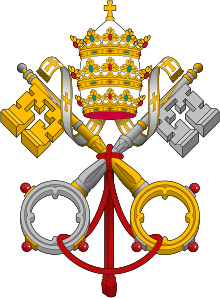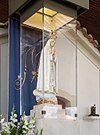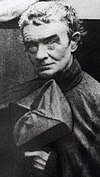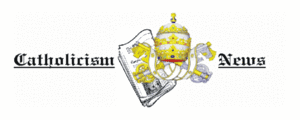Portal:Catholic Church
Introduction The Catholic Church, also known as the Roman Catholic Church, is the largest Christian church, with 1.28 to 1.39 billion baptized Catholics worldwide as of 2024. It is among the world's oldest and largest international institutions, and has played a prominent role in the history and development of Western civilization. The church consists of 24 sui iuris churches, including the Latin Church and 23 Eastern Catholic Churches, which comprise almost 3,500 dioceses and eparchies located around the world. The pope, who is the bishop of Rome, is the chief pastor of the church. The Diocese of Rome, known as the Holy See, is the central governing authority of the church. The administrative body of the Holy See, the Roman Curia, has its principal offices in Vatican City, a small independent city-state and enclave within the Italian capital city of Rome, of which the pope is head of state. The core beliefs of Catholicism are found in the Nicene Creed. The Catholic Church teaches that it is the one, holy, catholic and apostolic church founded by Jesus Christ in his Great Commission, that its bishops are the successors of Christ's apostles, and that the pope is the successor to Saint Peter, upon whom primacy was conferred by Jesus Christ. It maintains that it practises the original Christian faith taught by the apostles, preserving the faith infallibly through scripture and sacred tradition as authentically interpreted through the magisterium of the church. The Roman Rite and others of the Latin Church, the Eastern Catholic liturgies, and institutes such as mendicant orders, enclosed monastic orders and third orders reflect a variety of theological and spiritual emphases in the church. Of its seven sacraments, the Eucharist is the principal one, celebrated liturgically in the Mass. The church teaches that through consecration by a priest, the sacrificial bread and wine become the body and blood of Christ. The Virgin Mary is venerated as the Perpetual Virgin, Mother of God, and Queen of Heaven; she is honoured in dogmas and devotions. Catholic social teaching emphasizes voluntary support for the sick, the poor, and the afflicted through the corporal and spiritual works of mercy. The Catholic Church operates tens of thousands of Catholic schools, universities and colleges, hospitals, and orphanages around the world, and is the largest non-government provider of education and health care in the world. Among its other social services are numerous charitable and humanitarian organizations. (Full article...) Selected article
 Our Lady of Fatima (Portuguese pronunciation: [ˈfatimɐ]) is the title given to the Blessed Virgin Mary by those who believe that she appeared to three shepherd children at Fátima, Portugal on the 13th day of six consecutive months in 1917, starting on 13 May, the Fatima holiday. The title of Our Lady of the Rosary is also used in reference to the same apparition; the children related that the apparition specifically identified herself as "the Lady of the Rosary." It is also common to see a combination of these titles, i.e., Our Lady of the Rosary of Fatima (Portuguese: Nossa Senhora do Rosário de Fátima).Between May and October of 1917, three shepherd children, Lúcia Santos and her cousins Jacinta and Francisco Marto, reported visions of a luminous lady, believed to be the Virgin Mary, in the Cova da Iria fields outside the hamlet of Aljustrel, near Fatima, Portugal. The Lady appeared to the children on the 13th day of each month at approximately noon, for six straight months. The only exception was August, when the children were kidnapped by the local administrator.
Selected image
 Credit: Blieusong The façade of Notre-Dame de Paris, showing the Portal of the Virgin, Portal of the Last Judgment and Portal of St-Anne. Selected biography
 Bede (/biːd/; c. 672 or 673 – May 25, 735), also Saint Bede, the Venerable Bede, or (from Latin and Old English) Beda (Old English pronunciation: [ˈbeːdɑ]), was a Benedictine monk at the Northumbrian monastery of Saint Peter at Monkwearmouth, today part of Sunderland, and of its companion monastery, Saint Paul's, in modern Jarrow (see Wearmouth-Jarrow), both Northumbria. He is well known as an author and scholar, and his most famous work, Historia ecclesiastica gentis Anglorum (The Ecclesiastical History of the English People) gained him the title "The father of English history". Bede became known as Venerable Bede (Lat.: Beda Venerabilis) soon after his death, but this was not linked to consideration for sainthood by the Roman Catholic Church. In fact, his title is believed to come from a mistranslation of the Latin inscription on his tomb in Durham Cathedral, intended to be Here lie the venerable bones of Bede, but wrongly interpreted as here lie the bones of the Venerable Bede.
Did you know...

Related portalsFeast Day of July 21
Selected quote

— Robert Bellarmine Decree on the Bishops' Pastoral Office
News
SubcategoriesTopics
The Holy Bible:
Particular Churches (grouped by liturgical rite):
Things you can do
External resourcesWikiProjectsAssociated WikimediaThe following Wikimedia Foundation sister projects provide more on this subject:
Discover Wikipedia using portals |
































